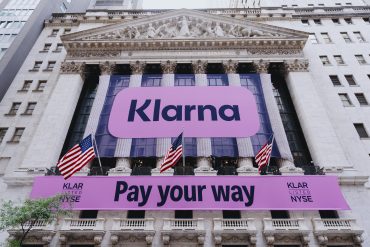
- Digital Lending
- IPO
- Public Markets
Klarna’s $15B NYSE Debut Marks Global Fintech’s Market Return
5 minute read

Swedish fintech giant Klarna returns to profitability as public markets debut marks major tech sector milestone
Key Takeaways
- IPO prices at $40 per share above expected range — Klarna raises $1.37 billion with $15 billion valuation, marking one of the year’s biggest tech IPOs on NYSE under “KLAR” symbol.
- Return to profitability after five-year streak — Company posts $21 million net profit in 2024 compared to $244 million loss in 2023, despite $152 million loss in first half of 2025 due to one-time expenses.
- Revenue grows 20% to $823 million — Second quarter performance shows continued expansion with 111 million active users and $105-112 billion gross merchandise volume despite widening quarterly losses.
Introduction
Klarna has priced its initial public offering at $40 per share, exceeding expectations and valuing the Swedish buy-now-pay-later giant at $15 billion. The fintech company raised $1.37 billion through the offering, surpassing its initial price range of $35 to $37 per share.
The IPO represents a pivotal moment for the digital lending sector and marks one of the most significant tech public offerings this year. Klarna will trade on the New York Stock Exchange under the ticker symbol “KLAR,” joining a resurgent wave of technology companies entering public markets.
Key Developments
Klarna’s path to public markets accelerated after years of delayed plans due to previous trade policies and market conditions. The company capitalized on favorable investor sentiment toward technology stocks, joining other high-profile IPOs including crypto firm Circle and software company Figma.
The offering structure allocates $1.17 billion to existing shareholders seeking to reduce their stakes, while Klarna retains $200 million for corporate purposes. This distribution reflects significant interest from current investors in monetizing their positions after years of private market growth.
According to CNBC, the company has expanded beyond its core “pay in four” installment model to include debit cards and broader financial services. This diversification strategy differentiates Klarna from competitors like Affirm, which focuses more heavily on interest-bearing loans.
Market Impact
The above-range pricing signals strong institutional demand for fintech exposure, particularly in the buy-now-pay-later segment. Investor confidence appears driven by Klarna’s improving financial metrics and strategic partnerships, including its recent Walmart collaboration.
The $15 billion valuation remains substantially below Klarna’s 2021 peak, reflecting broader recalibration in fintech valuations following the post-pandemic market correction. This more conservative pricing approach suggests lessons learned from previous overvaluations in the sector.
Digital lending markets continue expanding rapidly, with projections showing the U.S. market reaching $801 billion by 2029 at an 11.87% compound annual growth rate. Klarna’s public debut positions it to capture this growth through enhanced capital access and brand visibility.
Strategic Insights
Klarna’s business model centers on merchant fees, extended financing interest, and late payment penalties rather than traditional lending margins. This approach provides multiple revenue streams while reducing direct credit risk exposure compared to conventional lenders.
The company’s AI initiatives have faced recent setbacks, with what investors describe as an “AI retreat” raising questions about technology integration strategies. However, Klarna continues investing in automation and digital-first experiences that align with embedded finance trends.
Revenue diversification efforts beyond core buy-now-pay-later services demonstrate recognition that sustainable growth requires broader financial product ecosystems. This strategy positions Klarna to compete with traditional financial institutions rather than remaining a niche payment option.
Expert Opinions and Data
Financial performance shows mixed signals with revenue growing 20% to $823 million in the second quarter, while net losses widened to $53 million from $18 million year-over-year. The company achieved $21 million net profit for full-year 2024, marking its first profitable year since 2019.
Analysts highlight positive transaction margins and improved profit profiles but express caution about ongoing volatility and regulatory scrutiny facing buy-now-pay-later models. The first half of 2025 showed $152 million in net losses, primarily attributed to one-time IPO-related expenses.
Market experts view the offering as a bellwether for fintech sector recovery, potentially encouraging other technology companies to pursue public market debuts. However, they advise retail investors to approach with caution given typical IPO volatility and mixed early performance patterns.
Conclusion
Klarna’s successful IPO pricing validates investor appetite for profitable fintech companies while highlighting the sector’s evolution toward sustainable business models. The company’s return to profitability after five years of losses demonstrates the viability of disciplined growth strategies in digital lending.
The offering establishes Klarna as a public market benchmark for buy-now-pay-later services and embedded finance solutions. With 111 million active users and expanding merchant partnerships, the company enters public markets positioned to capitalize on continued digital payment adoption and consumer finance transformation.








